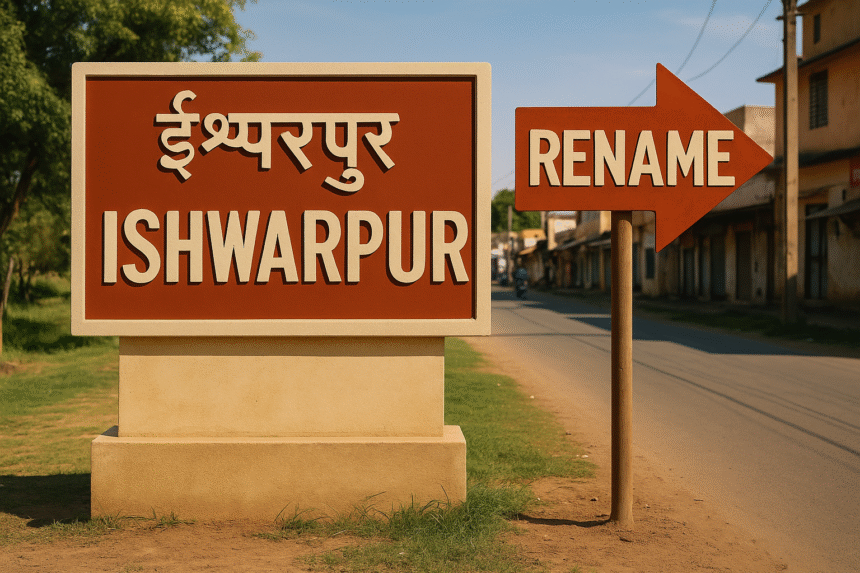“What’s in a name?” asked Shakespeare. In Indian politics, the answer is everything—from identity to ideology, from votes to virality.
The latest town to walk the path of transformation is Islampur, a quiet town in Maharashtra’s Sangli district. As of now, it will be officially known as Ishwarpur. And thus, another chapter has been added to India’s ever-growing playbook of what can only be called a Tactical Name Change movement.
- 🎬 Scene 1: From Islampur to Ishwarpur – A Symbolic Shift
- 🎯 Tactical Name Change – The New Political Toolkit?
- 🧩 But Why Now?
- 👥 Public Reaction: Cheers, Jeers, and Shrugs
- 📜 The Bureaucratic Domino Effect
- 🧠 Identity vs Infrastructure
- 📈 The Pattern: From Allahabad to Ishwarpur
- 🔍 What’s in a Name? A Lot, Apparently
- 📢 What Citizens Really Want
- 🎭 The Political Stage
- 🔚 Final Thoughts: A Name to Remember or Just Rebrand?
- 📌 TL;DR (Too Long; Didn’t Rename)
This isn’t just a matter of letters and signage. The Ishwarpur Rename has stirred up emotions, debates, and Twitter threads that could rival a Netflix plot twist. So, let’s unpack what’s going on here—and why a town’s renaming might be more than just cosmetic branding.
🎬 Scene 1: From Islampur to Ishwarpur – A Symbolic Shift
The Maharashtra government recently approved the renaming of Islampur, claiming it was in response to local demands. This was reportedly championed by social groups that believed the name “Ishwarpur” better reflected the spiritual and cultural heritage of the region.
So, what changed? Just a few letters. But with that, came a giant leap into the larger politics of identity and symbolism. One that says: we’re not just repainting the board—we’re redrawing the cultural map.
The Ishwarpur Rename is the latest in a long list of such name revisions—each loaded with intent, sentiment, and strategy.
🎯 Tactical Name Change – The New Political Toolkit?
Changing a city’s name might seem like a harmless act of nostalgia, but scratch beneath the surface, and you’ll find a powerful tactical tool—one that political parties wield with finesse.
Let’s break down the playbook of a typical Tactical Name Change:
- Cultural Repackaging: Rename a place to reflect local heritage or majority sentiment.
- Political Messaging: It sends a strong ideological signal to the party’s base.
- Distraction Tactic: Shift attention from development issues to symbolic victories.
- Narrative Control: Create a sense of historical “correction” that aligns with the present-day political ethos.
And voilà! You’ve got yourself a viral moment, press coverage, and likely a prime-time panel discussion.
🧩 But Why Now?
Timing, they say, is everything. The Ishwarpur Rename comes at a point when multiple states are engaging in what can only be called “identity rebranding.” This tactic not only revives historical pride but conveniently sets the tone for electoral positioning.
Moreover, it creates a narrative of governance that may not need visible roads or working drains—but definitely demands signboards that match sentiments.
👥 Public Reaction: Cheers, Jeers, and Shrugs
Like every name change before it, the Ishwarpur Rename has split public opinion wide open.
- Some locals cheered it as a long-overdue cultural correction.
- Others saw it as unnecessary political theater, masking real issues like unemployment, water scarcity, or pothole politics.
- A few simply shrugged and said, “Call it what you want, just don’t forget to fix the broken streetlights.”
This diversity of reaction is classic India—where even a town’s name is as democratic as a chai-stall debate.
📜 The Bureaucratic Domino Effect
Now that the name is set to change officially, the real admin work begins:
- Government records will need updating.
- Address proofs, land records, school certificates—all must align with the new name.
- Road signs, public transport stations, and even Google Maps will require updates.
It’s like the entire town is getting a digital and physical identity makeover. But while the makeover is underway, the question remains: will the local issues also get an equal facelift?
🧠 Identity vs Infrastructure
Here’s the million-rupee question: Is changing names helping change lives?
Renaming a town might give its residents a renewed sense of cultural pride. But what about:
- Sanitation?
- Road infrastructure?
- Access to education and health services?
The Tactical Name Change makes a lot of noise, but sometimes that noise overshadows basic necessities.
📈 The Pattern: From Allahabad to Ishwarpur
Ishwarpur is not alone in its journey of name-change fame. Across India, dozens of cities have undergone this transition:
- Allahabad became Prayagraj.
- Gurgaon became Gurugram.
- Mughalsarai became Deen Dayal Upadhyay Nagar.
And now, Ishwarpur Rename enters the club.
It’s a trend that says: “Names matter. And they matter more when elections are near.”
🔍 What’s in a Name? A Lot, Apparently
Names carry emotion. They reflect language, religion, culture, and heritage. A change in name isn’t just about maps—it’s about mindsets.
Supporters say it helps reclaim forgotten identities. Detractors say it’s a deflection tactic.
In truth, both perspectives can coexist. But only if renaming is accompanied by reimagining the place for the better—cleaner, safer, and economically stronger.
📢 What Citizens Really Want
Let’s flip the script for a second. If citizens had a “wishlist for development,” it might look like this:
- Better hospitals before better hoardings.
- Jobs before nameplates.
- Clean water before cultural branding.
- Functional schools before fancy fonts.
While the Ishwarpur Rename might give people a new identity, it must also be matched with real improvements. Otherwise, it remains just a symbolic PR move.
🎭 The Political Stage
For politicians, this move strengthens grassroots messaging. It reinforces loyalty to cultural values. And yes—it makes for a good one-liner in campaign speeches.
But if voters begin demanding accountability alongside identity, the Tactical Name Change could go from “easy win” to “tough sell.”
🔚 Final Thoughts: A Name to Remember or Just Rebrand?
The Ishwarpur Rename tells us that in Indian politics, the symbolic and the strategic often walk hand in hand. It’s a reminder that names aren’t just names—they are narratives, tactics, and headlines rolled into one.
But here’s the thing—when the buzz dies down and the placards fade, what remains is the quality of life for the people who live there.
And that, dear reader, should matter more than any signboard.
📌 TL;DR (Too Long; Didn’t Rename)
- Ishwarpur Rename changes Islampur’s identity in Sangli, Maharashtra.
- It’s part of a broader trend of Tactical Name Change for cultural or political reasons.
- Public opinion is mixed—pride, protest, and pragmatism abound.
- Real development must go hand-in-hand with symbolic changes.












